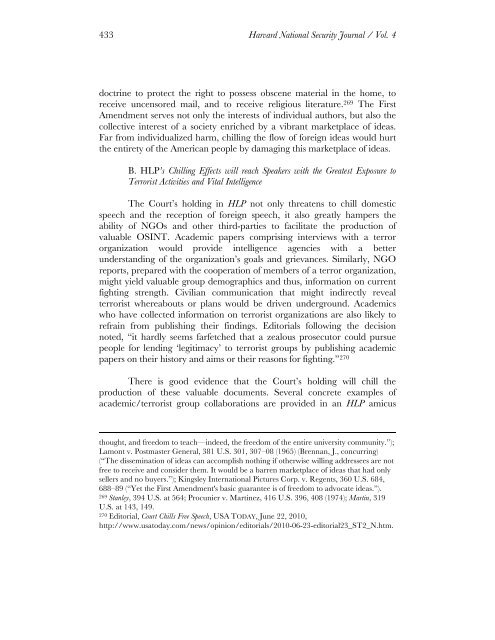Vo.4-Moshirnia-Final
Vo.4-Moshirnia-Final
Vo.4-Moshirnia-Final
You also want an ePaper? Increase the reach of your titles
YUMPU automatically turns print PDFs into web optimized ePapers that Google loves.
433 Harvard National Security Journal / Vol. 4<br />
doctrine to protect the right to possess obscene material in the home, to<br />
receive uncensored mail, and to receive religious literature. 269 The First<br />
Amendment serves not only the interests of individual authors, but also the<br />
collective interest of a society enriched by a vibrant marketplace of ideas.<br />
Far from individualized harm, chilling the flow of foreign ideas would hurt<br />
the entirety of the American people by damaging this marketplace of ideas.<br />
B. HLP’s Chilling Effects will reach Speakers with the Greatest Exposure to<br />
Terrorist Activities and Vital Intelligence<br />
The Court’s holding in HLP not only threatens to chill domestic<br />
speech and the reception of foreign speech, it also greatly hampers the<br />
ability of NGOs and other third-parties to facilitate the production of<br />
valuable OSINT. Academic papers comprising interviews with a terror<br />
organization would provide intelligence agencies with a better<br />
understanding of the organization’s goals and grievances. Similarly, NGO<br />
reports, prepared with the cooperation of members of a terror organization,<br />
might yield valuable group demographics and thus, information on current<br />
fighting strength. Civilian communication that might indirectly reveal<br />
terrorist whereabouts or plans would be driven underground. Academics<br />
who have collected information on terrorist organizations are also likely to<br />
refrain from publishing their findings. Editorials following the decision<br />
noted, “it hardly seems farfetched that a zealous prosecutor could pursue<br />
people for lending ‘legitimacy’ to terrorist groups by publishing academic<br />
papers on their history and aims or their reasons for fighting.” 270<br />
There is good evidence that the Court’s holding will chill the<br />
production of these valuable documents. Several concrete examples of<br />
academic/terrorist group collaborations are provided in an HLP amicus<br />
thought, and freedom to teach—indeed, the freedom of the entire university community.”);<br />
Lamont v. Postmaster General, 381 U.S. 301, 307–08 (1965) (Brennan, J., concurring)<br />
(“The dissemination of ideas can accomplish nothing if otherwise willing addressees are not<br />
free to receive and consider them. It would be a barren marketplace of ideas that had only<br />
sellers and no buyers.”); Kingsley International Pictures Corp. v. Regents, 360 U.S. 684,<br />
688–89 (“Yet the First Amendment's basic guarantee is of freedom to advocate ideas.”).<br />
269 Stanley, 394 U.S. at 564; Procunier v. Martinez, 416 U.S. 396, 408 (1974); Martin, 319<br />
U.S. at 143, 149.<br />
270 Editorial, Court Chills Free Speech, USA TODAY, June 22, 2010,<br />
http://www.usatoday.com/news/opinion/editorials/2010-06-23-editorial23_ST2_N.htm.
















